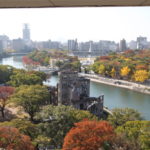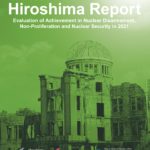Weaving Peace for the Next Generation — From Us, Who Live in a Peaceful Country
Kinoshita Yuki
Kinoshita Yuki
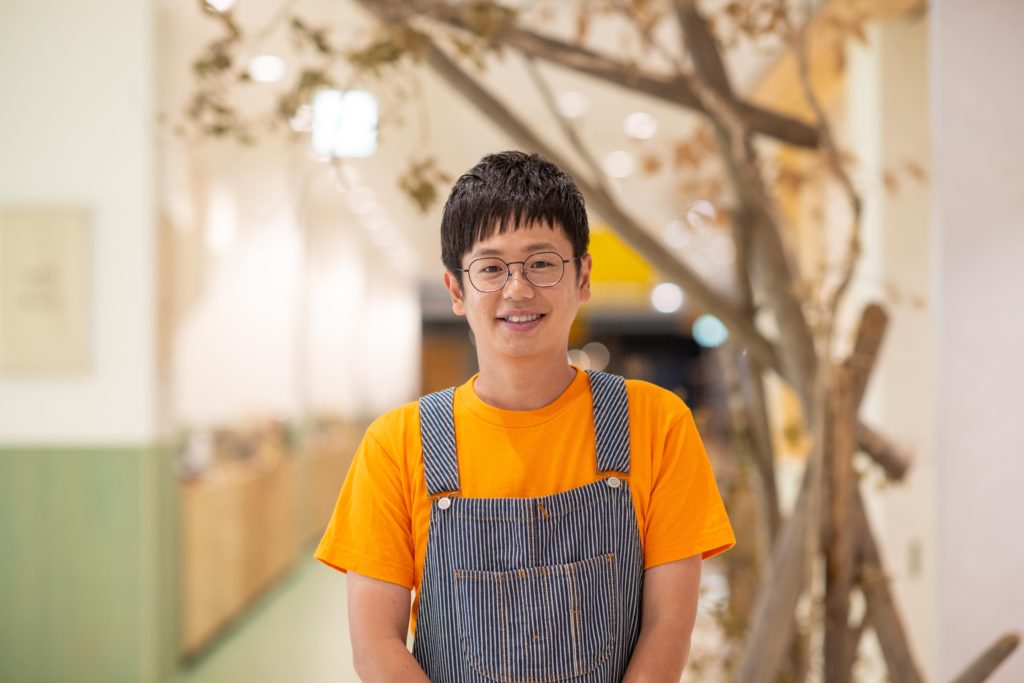
Summers Spent at My Grandparents’ Home in Nagasaki
My father is from Nagasaki Prefecture.
As a child, I spent every summer vacation at my grandparents’ house in Nagasaki. Because of this, I have been to Peace Park and the Atomic Bomb Museum as a child. My grandfather told me stories about the war and the events of the atomic bombing. Although none of my direct relatives were exposed to the atomic bombings, my father told me about someone in the neighborhood who was. The tragedy gave him keloids on his back. My grandfather also told me about his father, who lived in Sasebo at the time. My great-grandfather visited Nagasaki shortly after the tragedy and died of illness afterward, perhaps due to the effects of the bombing.
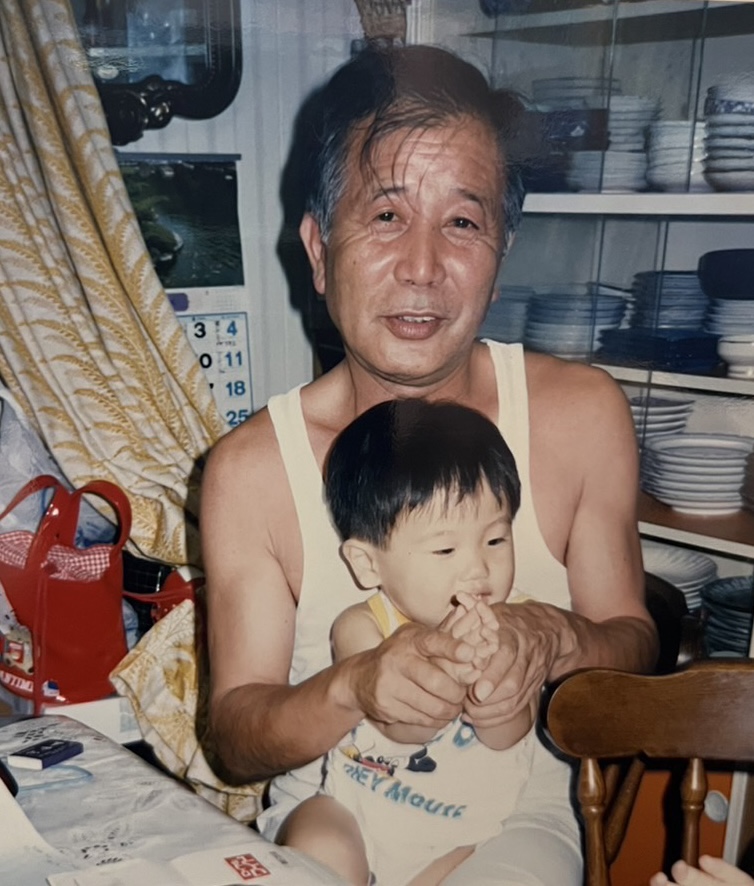
As a child, hearing about these stories and seeing what happened afterward made me strongly view war as something to be feared and avoided. I was only in elementary school at the time, so I had not seen or heard detailed materials about the atomic bombing, nor had I read any related diaries and memoirs carefully. However, I remember seeing the pictures of what happened immediately after the atomic bombing. The city was reduced to ashes, and the people and buildings were scorched black. I remember being struck with the painful feeling that the sight alone was enough to make me realize how tragic the situation was.
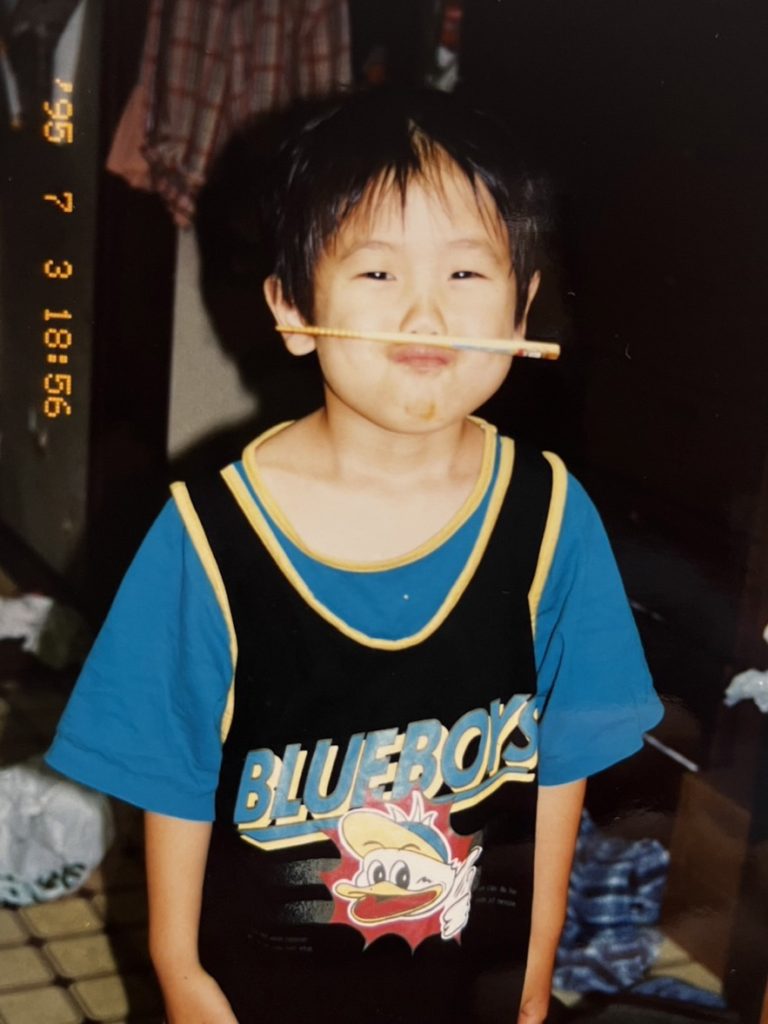
A New Feeling of Peace After Moving to Hiroshima
I was born and raised in Nagoya. I also got married and started a family there. Nagoya is an easy place to live in, but my wife and I felt we should raise our children in a town rich in nature someday.
I started performing in public as a street performer when I was 15 and entered the comedy world at 19. I was recognized as a street performer who could talk to an audience, hosting events throughout Japan. I was also the general host of the Fukuyama Street Performance Festival, which is held every May simultaneously with the Fukuyama Rose Festival. Because of this, I went to Fukuyama, Hiroshima Prefecture every year for around a decade. These times gave me the impression that Fukuyama was a wonderful town with lots of nature and warm people.
I decided to live in Fukuyama because of the TV program “Juuden sasete moraemasen ka? (Can You Let Me Charge My Battery?)” starring Degawa Tetsuro. I was impressed by the beautiful scenery of the Shimanami Kaido cycling route that Mr. Degawa and his group rode on with their e-bikes. I chose Fukuyama because it was close to the Shimanami Kaido, where I go every year for work. I also already established connections and had business associates in Fukuyama, so, I moved there in 2020. At that time, I still had two children: a seven-year-old boy and a one-year-old daughter. My second son would be born later in Fukuyama.
Fukuyama has both the ocean and mountains within a 30-minute drive, along with rivers. The scenery when we were moving there was also beautiful. Because of this, traveling was not stressful for me at all. In fact, it felt like leisure. Travel for 30 minutes within the city, and all you’ll see are buildings. No changes. Many people in Fukuyama don’t realize its abundant nature. Even before and after moving to the city, they tend to say that Fukuyama has nothing to offer. I couldn’t disagree more!
On the day we moved to Fukuyama, I took my kids to a neighborhood park. I looked at the sky and saw a dragonfly and a crow fighting midair. First, my seven-year-old son was really excited to see a fight between a dragonfly and a crow. The dragonfly and the crow continued their fight, flying far away until we could no longer see them. In the city, it’s not easy to spot birds and planes flying because of the buildings. However, in Fukuyama, the sky is so wide that you can see the birds flying until they’re out of sight. I felt deeply moved by how wide the sky was.
Fukuyama’s sky is wide and blue; its mountains lush and green, and even now, four years after moving here, the beautiful scenery never fails to impress me. We can witness the abundance of nature every day. Nothing can beat this peace and luxury.
The Preciousness of Peace I Felt When I Became a Parent
I myself did not think about the future before I had kids. I wasn’t interested in what would happen to Japan and the world. Today was the only day that mattered, and I thought only of my own happiness.
However, that changed after my children were born. I started wanting the world to be a good place for them to grow up in. And my thoughts for peace only grew stronger after moving to Hiroshima.
I’m currently appearing once a week on RCC Broadcasting’s “Imanama!” TV program. It really makes me feel that Hiroshima is getting far more war-related and atomic bomb-related media coverage than any other region.
Our son went on a field trip to Hiroshima Peace Memorial Park the other day. Before that, he did some preliminary study at school about the atomic bombing and Peace Memorial Park. I was surprised at the number of peace education efforts in Hiroshima. There weren’t as many peace education activities in Nagoya when I was in elementary school. I feel that this environment has nurtured and rooted a high level of awareness of peace among the people of Hiroshima Prefecture.
My feelings when I visited Hiroshima Peace Memorial Museum after I became a parent were very different from when I went to Nagasaki’s Peace Memorial Hall as a child and when I visited Hiroshima Peace Park on a high school field trip.
As a child, my only thoughts upon seeing the tragic photos and documents at the Nagasaki National Peace Memorial Hall for the Atomic Bomb Victims were that they were tragic. However, when I became a parent and took a more detailed look at the photos and documents, I understood the various realities and realized once again that these events should have never been allowed to happen.
Among the photos and documents of the atomic bombing of Hiroshima were the deaths of children the same age as my own, including a brother who lost his younger sister in the war. I couldn’t help but compare them to my own children. It made my heart ache.
I could really feel war as a personal problem, not just someone else’s.
We would like to continue living in Hiroshima. As the saying goes, children grow up watching their parents’ backs, and I really think that’s the case. The prejudices and discriminatory attitudes of the parents get passed on to their children. That’s why I myself would like to show that I am always considerate of others, that I have respect and appreciation for them, and that people are not defined by their race, country, gender, or age.
“Why Wage War?” — We, Who Live in a Peaceful Country
In raising my children, I always try to talk to them about everything relating to my work and daily life. For example, I tell them that I didn’t want to go to work today or that I messed up the job earlier. Although many parents don’t want their children to hear their complaints or negative feelings, I go out of my way to express them.
For example, if my eldest son, who is in fifth grade right now, gets into a fight with a friend in the future and feels that he doesn’t want to go to school, I want him to know that he can talk to his family about his feelings. It’s not easy for children to tell their parents they don’t want to go to school or they had a fight with a friend. That’s why I actively express my negative feelings in the house, so my children will know it’s okay to do so. When I return home from work, my eldest son sometimes asks me, “Dad, did your work go well today?” I would then give him an honest answer, like, “Nah, not really.” A bad day at work is not so different from when the teacher gets angry with the child at school. I want my children to know that this is neither shameful nor embarrassing to talk about.
If my child can say, “I got scolded today,” I can ask, “What’s wrong?” and give them advice. Children need to express what they actually feel deep down. Otherwise, these emotions will pile up and become painful. In our family, we regularly talk to each other to prevent this from happening. On the other hand, if it was a good day, I’d make a deal about it and say things like, “The studio was rocking today!” The most important thing for me is having a family with whom I can share my thoughts and feelings.
Due to the nature of this parent-child relationship, we’d naturally talk about the wars going on in the world with our children. Peace education and similar activities also foster a deep-rooted awareness in our children about the horrors of war. Because of this, I make it a point to remind them from time to time that war is terrifying and should be absolutely prohibited, instilling a sense of peace in them.
It pains my heart to see news of children harmed by air strikes in all kinds of wars. Wars are started by the heads of the country. It is unforgivable that they are letting innocent little children lose their lives and their families. There may be circumstances that only the country’s leaders can understand, which lead them to wage war. Still, no one should ever do it. Despite that, why do we do it? I wonder about that, too.
If the country’s leaders imagined that their children might come to harm, that their children might have to fight in a war, or that they might lose their families, maybe they’d stop. Why can’t they use their imagination?
For example, small children often fight over a single toy. They can’t simply agree to share. Young children are sometimes inconsiderate of others, so if a toy is taken from them, they may cry or even take it back by force. I feel that war is not very much different from this.
Can’t we think of a way for both sides to play with one toy together? Why do we have to resort to violence if we can compromise? I’m sure the adults back then taught us this lesson when we were young. Children make me feel it is important for adults, children, and the country’s leaders to understand the feelings of others and to use their imagination to be compassionate to others.
When my children asked me something, I used to teach them what they should think. If they were curious about something, I’d simply tell them my answer. However, there was a time when my wife answered my child with, “Why do you think that is?” At that time, my wife told me it was better to let the child think more instead of spoon-feeding them the answers. I realized that this was indeed important.
Since then, I’ve always tried to make my children think for themselves while giving hints rather than immediately giving them the answer. By asking them how they came to their conclusion, the child can investigate and think about the matter using their own hypotheses. They will grow up wiser that way, and they will have the imagination to understand why things happen.
Children today, in particular, tend to seek instant “answers” because they can quickly look things up online. They are satisfied with simply knowing the answer and do not investigate the process of why it is so. I feel they are missing the opportunity to think about how things became what they are.
Nurturing relationships absolutely requires the imagination to empathize with others. I am sure accumulating such thoughts and habits will lead to a world without conflict.
“Why wage war?”
I feel that it is important for us, who live in a peaceful country, to think together with the children, as they will be the ones to lead the next generation.
Peaceful Days to Continue Onto the Next Generation
I don’t want my children to discriminate or hold prejudices, so I want them to make friends with people worldwide.
I went with my family to stay at Okunoshima Island the other day and became friends with a family from Philadelphia, USA. My eldest daughter got along with a girl her own age. Although they didn’t speak the same language, they held hands and ran around together, and at the end, they hugged each other and said bye-bye.
If we made friends with people from other countries like this, we wouldn’t think of going to war with people from that country. That is why I want children to make friends from all sorts of countries and get along with them. I also hope they will grow up with a broad and warm perspective.
Profile
Kinoshita Yuki (木下ゆーき)
Kinoshita Yuki was born in Aichi Prefecture in March 1989. He is a TV personality and influencer with over 700,000 followers on his social media accounts. Kinoshita used to be a single father but is now raising three children with his wife. He is also a certified child counselor and the author of #Hodo-hodo Ikuji (#ParentingInModeration) and Sekai-ichi Tanoshii Kosodate Idea Taizen (The World’s Most Fun Child-Raising Ideas Compendium).
Tags associated with this article



